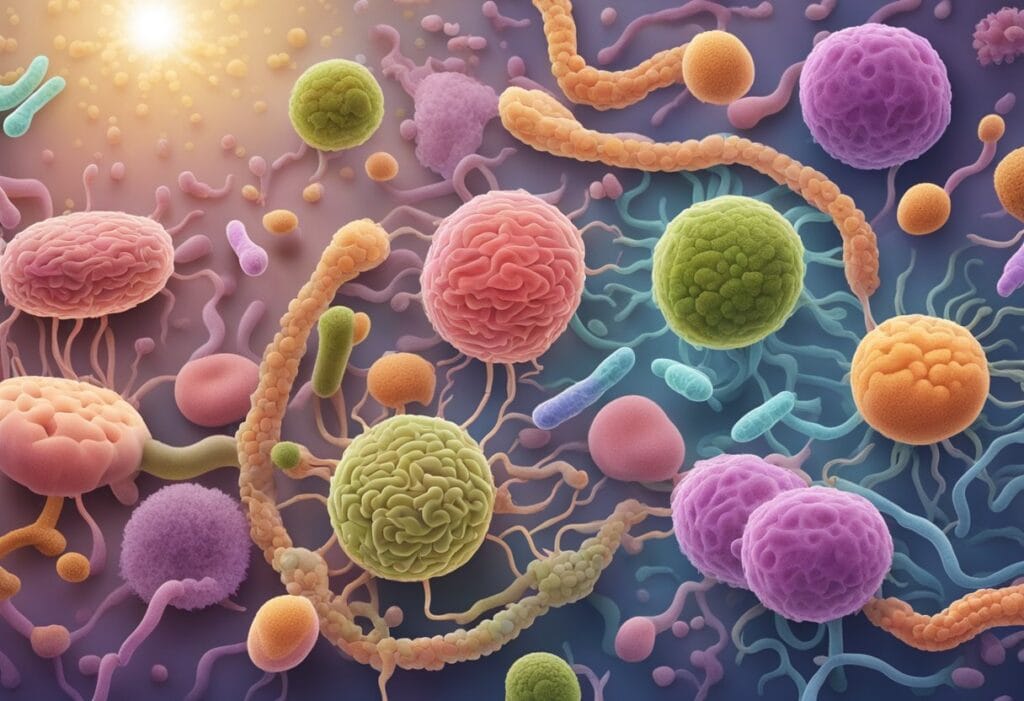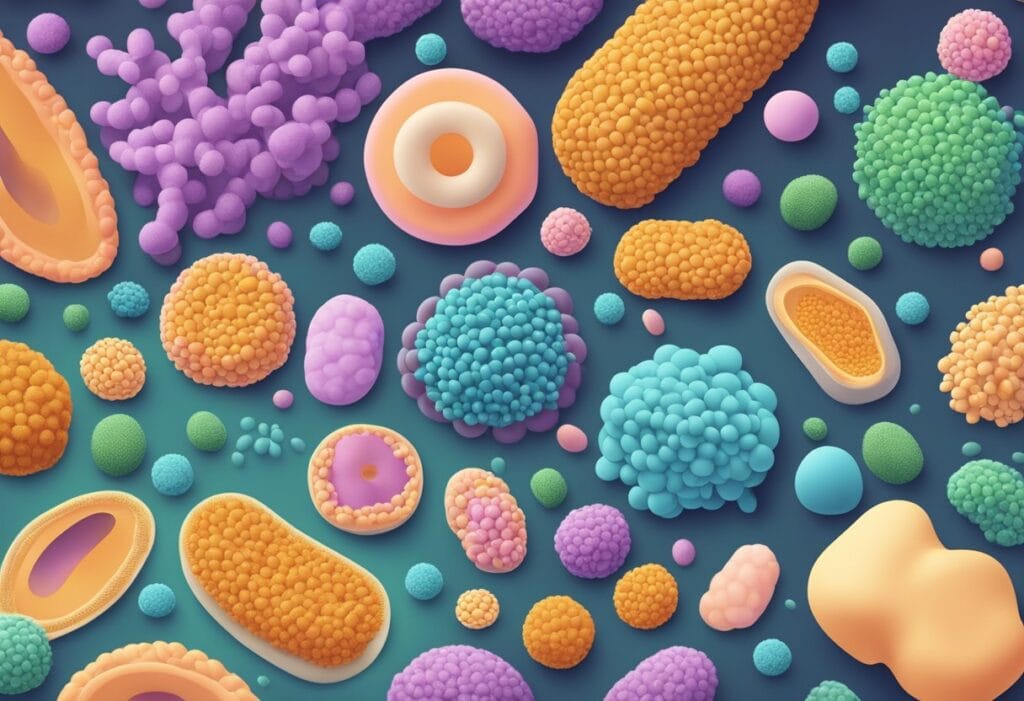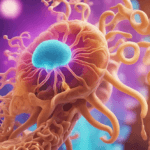How Your Gut Flora Impacts Your Health is not just a tantalizing topic for health enthusiasts and kombucha aficionados; it’s a subject that has scientists and doctors buzzing with excitement, and possibly a few bacteria puns. Welcome to the world within you, a bustling metropolis of microorganisms that could give New York City a run for its money in terms of population density and diversity. This isn’t just any old town hall meeting in your intestines; it’s a full-blown microscopic rave, and you’re the host!
In this blog post, we’re pulling back the curtain—or should we say, the intestinal lining—to reveal the secret life of your gut microbiota. Imagine a tiny, teeming ecosystem right in the core of your being, a place where billions of bacteria call the shots and play a pivotal role in everything from your metabolism to your mood. It’s like finding out your body is throwing a party every day, and you didn’t even know you were invited.
But it’s not all about the boogie-woogie for these bacterial buddies. The harmony within your gut flora is a delicate dance, one that requires balance, rhythm, and the right nutrition to keep the good times rolling. When the music stops and the balance is lost, that’s when health issues can waltz in, uninvited, and start to tango with your well-being. From irritable bowel syndrome to anxiety, the effects of a discordant gut microbiome are as varied as the bacteria themselves.
So, buckle up and grab your prebiotics—or should we say, your all-access backstage passes—as we embark on a fascinating journey through the winding corridors of your gastrointestinal tract. We’ll explore the latest research, debunk myths, and maybe even share a laugh or two at the expense of these microscopic party animals. After all, who knew that such tiny creatures could have such an enormous impact on your health?
By the end of this post, you’ll have a newfound appreciation for the bustling metropolis within you and the tools to be the mayor your gut flora deserves. Let’s dive in, shall we? Because when it comes to understanding How Your Gut Flora Impacts Your Health, ignorance is not bliss—it’s bloating.
Overview on How Your Gut Flora Impacts Your Health
Our gut is home to trillions of microorganisms, collectively known as the gut flora or microbiome. These tiny organisms play a crucial role in our overall health and well-being. From digestion to immune system function, our gut flora impacts nearly every aspect of our health.

Research has shown that an imbalance in our gut flora, also known as dysbiosis, can lead to a range of health issues, including digestive problems, autoimmune disorders, and even mental health conditions. On the other hand, a healthy gut flora can help protect against these conditions and promote optimal health.
In this article, we will explore the fascinating world of gut health and the microbiome. We will discuss the importance of a healthy gut flora, how it impacts our health, and what we can do to support and maintain it. Whether you’re looking to improve your digestive health, boost your immune system, or simply feel your best, understanding the role of your gut flora is essential.
Understanding Gut Flora and the Microbiome
The gut microbiome is a complex and diverse ecosystem of microorganisms, including bacteria, viruses, fungi, and other microorganisms that live in our digestive tract. This ecosystem plays a crucial role in our overall health and well-being, influencing everything from our digestion and immune function to our mental health and emotional well-being.
Composition of Gut Microbiota
The gut microbiome is made up of trillions of microorganisms, including over 1,000 different species of bacteria. These bacteria can be divided into two main groups: beneficial bacteria, which help to maintain a healthy balance in the gut, and harmful bacteria, which can disrupt this balance and lead to a condition known as gut dysbiosis.
Role of Gut Flora in Digestion
The gut microbiome plays a vital role in digestion, helping to break down food and absorb nutrients. Beneficial bacteria in the gut produce enzymes that help to break down complex carbohydrates, proteins, and fats, making them easier for the body to digest and absorb.
The Gut-Brain Connection
Recent research has also shown that the gut microbiome can have a significant impact on our mental health and emotional well-being. This is due to the gut-brain connection, which refers to the communication pathway between the gut and the brain.
The gut microbiome produces several neurotransmitters, including serotonin, dopamine, and GABA, which are essential for regulating mood, anxiety, and stress. This means that an imbalance in the gut microbiome can lead to a range of mental health issues, including anxiety, depression, and even autism.
In conclusion, understanding the composition and role of gut flora in the microbiome is crucial for maintaining good health. By promoting a healthy balance of beneficial bacteria in the gut through the use of probiotics and prebiotics, we can improve our digestion, boost our immune system, and even enhance our mental health and emotional well-being.
Impact of Diet on Gut Health

The food we eat has a significant impact on the health of our gut flora. Our gut microbiome is a complex ecosystem that is influenced by various factors, including our diet. In this section, we will discuss the impact of diet on gut health and explore the different ways in which our food choices can affect our gut flora.
Influence of Fiber and Nutrients
Fiber and nutrients are essential for maintaining a healthy gut. Fiber is a type of carbohydrate that is not digested by the body but is instead broken down by gut bacteria. This process produces short-chain fatty acids (SCFAs), which are beneficial for gut health. Nutrients such as vitamins and minerals are also important for the growth and maintenance of gut bacteria.
Eating a diet rich in fiber and nutrients, such as fruits, vegetables, and whole grains, can promote the growth of beneficial gut bacteria and improve gut health.
Effects of Processed Foods and Sugar
Processed foods and sugar can have a negative impact on gut health. These foods are often low in fiber and nutrients and can disrupt the balance of gut bacteria. High sugar intake has been linked to an increased risk of gut inflammation, which can lead to a range of health problems.
Reducing the intake of processed foods and sugar can help improve gut health and promote the growth of beneficial gut bacteria.
Benefits of Fermented Foods
Fermented foods such as yogurt, kimchi, and sauerkraut contain live bacteria that can help improve gut health. These foods are rich in probiotics, which are beneficial bacteria that can help restore the balance of gut flora.
In addition to probiotics, fermented foods also contain prebiotics, which are types of fiber that feed the beneficial gut bacteria. Incorporating fermented foods into your diet can help promote the growth of beneficial gut bacteria and improve gut health.
In conclusion, our diet plays a crucial role in the health of our gut flora. Eating a diet rich in fiber and nutrients, reducing the intake of processed foods and sugar, and incorporating fermented foods can help promote the growth of beneficial gut bacteria and improve gut health.
Gut Flora and Disease Prevention

Maintaining a healthy gut flora can have a significant impact on disease prevention. In this section, we will explore the relationship between gut flora and disease prevention, including its impact on immune function, obesity and diabetes, and mental health.
Gut Health and Immune Function
The gut plays a crucial role in the immune system, and maintaining a healthy gut flora is essential for optimal immune function. The gut is home to trillions of bacteria, which help to protect the body against harmful pathogens. A healthy gut flora can help to prevent infections and reduce the risk of autoimmune diseases.
Relationship with Obesity and Diabetes
There is a growing body of evidence that suggests a link between gut flora and obesity and diabetes. Studies have shown that individuals with an imbalance in their gut flora may be more likely to develop these conditions. A healthy gut flora can help to regulate metabolism and reduce inflammation, which can help to prevent obesity and diabetes.
Gut Microbiota and Mental Health
The gut-brain axis is a complex relationship between the gut and the brain, and emerging research suggests that gut flora can play a role in mental health. An imbalance in gut flora has been linked to anxiety and depression, and a healthy gut flora may help to reduce the risk of these conditions.
In conclusion, maintaining a healthy gut flora is essential for disease prevention. By promoting a healthy gut flora, we can support immune function, reduce the risk of obesity and diabetes, and promote mental health.
Disruptions in Gut Flora Balance

When the balance of good and bad bacteria in our gut is disrupted, it can lead to various health problems. Here are some of the common causes of disruptions in gut flora balance:
Antibiotics and Gut Flora
Antibiotics are commonly used to treat bacterial infections, but they can also kill off the good bacteria in our gut along with the bad ones. This can lead to an overgrowth of harmful bacteria and cause gastrointestinal problems such as diarrhea, bloating, and abdominal pain. It is important to only take antibiotics when necessary and to take probiotics to restore the balance of good bacteria in the gut.
Dysbiosis and Gastrointestinal Conditions
Dysbiosis is a condition where there is an imbalance of good and bad bacteria in the gut. This can be caused by a variety of factors such as a poor diet, stress, and medications. Dysbiosis has been linked to various gastrointestinal conditions such as irritable bowel syndrome (IBS), inflammatory bowel disease (IBD), and small intestinal bacterial overgrowth (SIBO). Symptoms of dysbiosis include bloating, gas, constipation, and diarrhea.
Probiotics and Prebiotics in Restoring Balance
Probiotics are live bacteria that can help restore the balance of good bacteria in the gut. They can be found in fermented foods such as yogurt, kefir, and sauerkraut, as well as in supplement form. Prebiotics are a type of fiber that feed the good bacteria in the gut. They can be found in foods such as garlic, onions, and bananas.
In conclusion, disruptions in gut flora balance can have a negative impact on our health. It is important to take steps to maintain a healthy balance of good and bad bacteria in the gut, such as avoiding unnecessary antibiotics, eating a healthy diet, and taking probiotics and prebiotics.
Lifestyle Factors Affecting Gut Flora

Maintaining a healthy gut flora is essential for overall health and well-being. While genetics play a role in determining the composition of our gut microbiome, lifestyle factors also play a crucial part. In this section, we will explore how exercise, sleep, and stress affect gut microbiota diversity.
Exercise and Gut Microbiota Diversity
Regular exercise has numerous benefits for our physical and mental health. Recent studies have shown that exercise can also have a positive impact on gut microbiota diversity. Exercise has been found to increase the abundance of beneficial bacteria such as Akkermansia muciniphila and Faecalibacterium prausnitzii, which are associated with improved gut health and reduced inflammation.
In addition, exercise has been shown to increase short-chain fatty acid production, which provides energy to the cells lining the intestine and promotes gut health. It is recommended to engage in moderate-intensity exercise for at least 30 minutes per day to reap the benefits for gut microbiota diversity.
Sleep, Stress, and the Microbiome
Sleep and stress are two lifestyle factors that can have a significant impact on gut microbiota diversity. Chronic stress has been found to alter the composition of the gut microbiome, leading to a decrease in beneficial bacteria and an increase in harmful bacteria. This can lead to inflammation and a compromised immune system, which can negatively impact overall health.
Sleep deprivation has also been linked to changes in gut microbiota composition. A lack of sleep can lead to an increase in harmful bacteria and a decrease in beneficial bacteria, which can contribute to inflammation and a weakened immune system.
In conclusion, lifestyle factors such as exercise, sleep, and stress can have a significant impact on gut microbiota diversity and overall gut health. Incorporating regular exercise, getting enough sleep, and managing stress can help promote a healthy gut microbiome and improve overall health and well-being.
Frequently Asked Questions

Why is maintaining gut health essential for well-being?
Maintaining gut health is essential for overall well-being because our gut is home to trillions of microorganisms, including bacteria, fungi, and viruses. These microorganisms, collectively known as gut flora, play a crucial role in digestion, immune function, and even mental health. When our gut flora is imbalanced, it can lead to a host of health problems, including digestive issues, inflammation, and even chronic diseases.
What are the consequences of a disturbed gut microbial balance?
A disturbed gut microbial balance, also known as dysbiosis, can have a range of consequences on our health. Dysbiosis has been linked to a variety of health problems, including irritable bowel syndrome (IBS), inflammatory bowel disease (IBD), allergies, autoimmune diseases, and even mental health disorders such as depression and anxiety.
What natural methods can increase beneficial gut bacteria?
There are several natural methods that can help increase beneficial gut bacteria, including:
- Eating a diet rich in fiber and fermented foods
- Taking probiotics supplements
- Reducing stress levels through meditation or exercise
- Getting enough sleep
- Avoiding antibiotics unless absolutely necessary
What foods promote a healthy gut microbiome?
Foods that promote a healthy gut microbiome include:
- Fermented foods such as yogurt, kefir, sauerkraut, and kimchi
- High-fiber foods such as fruits, vegetables, whole grains, and legumes
- Prebiotic foods such as garlic, onions, and leeks
How do gut bacteria contribute to overall human health?
Gut bacteria contribute to overall human health in several ways, including:
- Digestion and absorption of nutrients
- Regulation of the immune system
- Production of vitamins and other beneficial compounds
- Protection against harmful pathogens
Overall, maintaining a healthy gut microbiome is crucial for overall health and well-being.
Final Thoughts
And there you have it, the grand tour of your gut’s very own ‘Microbiota Metropolis.’ As we draw the curtains on our exploration of How Your Gut Flora Impacts Your Health, it’s clear that the microscopic citizens of your inner ecosystem are more than just passive residents; they’re active contributors to your overall well-being, the unsung heroes of your health narrative.
We’ve navigated the intricate streets of your digestive system, uncovered the secrets of bacterial balance, and even peeked into the alleyways where diet and lifestyle choices can lead to microbial mayhem. With every fiber-rich meal, every probiotic supplement, and each stress-relieving breath, you have the power to influence the delicate equilibrium of your gut flora, shaping the destiny of your health like a skilled urban planner.
But remember, dear reader, with great power comes great responsibility. Your gut is not merely a vessel; it’s a vibrant community that thrives on your mindful stewardship. The choices you make at the supermarket, the dinner table, and even in moments of indulgence are the policies that govern this inner city. Will you be a benevolent leader, fostering growth and harmony? Or will your governance lead to a gut-bral uprising?
As you step back into the hustle and bustle of your daily life, keep in mind the lessons learned from the world within. Nurture your gut flora with the care of a master gardener, and watch as your health blossoms like a well-tended garden. Remember, the road to wellness is paved with good intestines—er, intentions.
Before we part ways, let’s raise a glass of kombucha (or a fiber-rich smoothie, if that’s more your style) to your gut microbiota. May the party in your belly continue to be the life-affirming bash that keeps you dancing through life with vigor and vitality.
Thank you for joining us on this gastrointestinal journey. We hope you leave with not just a wealth of knowledge, but also a belly full of laughs and a newfound respect for the trillions of tiny tenants that call you home. Until our next health escapade, keep feeding the good bacteria, and they’ll keep feeding you the good life. Cheers to your health, and remember: a happy gut is a happy you!










